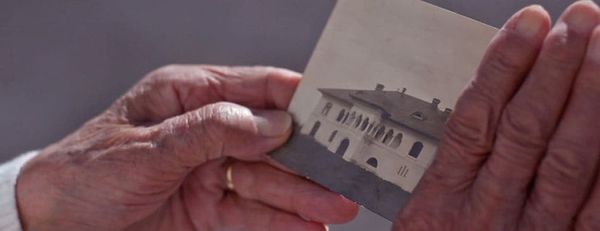Eye For Film >> Movies >> The Search For Emak Bakia (2012) Film Review
The Search For Emak Bakia
Reviewed by: Robert Munro

A wonderful surprise of a film, The Search For Emak Bakia is a beautifully shot documentary which attempts to retrace the American artist Man Ray’s 1927 short film, Emak Bakia. In doing so, this documentary not only enlightens and engages us with its subject matter, it becomes an enrapturing work all of its own.
Emak Bakia, translated from Basque, reads “Leave me alone”. It is symptomatic of Man Ray’s intention when making his original film. Given $10,000 and a house in Biarritz, Ray secluded himself from outside influences and made a uniquely personal film. A film which resonated with Oskar Alegria, who picks up his camera to not only search for the physicality of Emak Bakia – the house where it was shot – but also its spiritual sense of being: its ethos. If that all sounds a bit pretentious and artsy fartsy, you’ll find sympathy with this reviewer. However, the film’s simplicity and wide-eyed curiosity will surely win over the most sceptical of minds.

Alegria’s search begins in a graveyard in Biarritz; it is rumoured that Man Ray saw a tombstone engraved with the words Emak Bakia, and found it so fascinating that someone would wish to be left alone upon death that he chose it as the title of his film. The rumour turns out to be untrue, but Alegria finds the grave of a clown which so fascinates him that he goes off on a tangent, searching for a whisper on the wind.
Such tangential deviations occur frequently. During some more research, he discovers a postcard sent form Biarritz to Paris (although not from Man Ray) which simply has written on it: “Are you behaving?” Algeria is so enamoured with the curiously curt greeting that he ventures off to find the recipient of it, or their descendants, only to be met with a nameless buzzer. Another dead end.
Yet all these dead ends and false starts help to build a picture of the elusiveness of Ray’s art, as expressed through Emak Bakia. Alegria mixes footage from Ray’s film with his own, often mirroring the images across a split screen. It soon becomes clear that it isn’t the destination, and the discovery of Emak Bakia, that is the most interesting thing about the film, but the journey itself.
Alegria has a wonderful eye for cinema. His wandering camera captures images that we wouldn’t have seen or thought worthy of observation with the naked eye. He captures the tiniest of seemingly insignificant details, creating a wealth of texture on the screen. The most impressive example of this comes after he’s found the house entitled Emak Bakia, and films a lightning storm. Shot in slow motion, and foregrounded by the silhouette of a (surprise, surprise) curious cat, the images of the storm above the house are emphatic in their beauty.
Upon finding the house, the story of Emak Bakia doesn’t end, but rather begins all over again. He discovers that he’s not the only visitor in search of the house – it’s now renamed and is a rest-home for local factory workers – but a 90-something Romanian exile table-tennis champion Princess has been asking the same questions of the current owners.
The film pulls on any old loose bit of thread it finds in front of it and seems to find magic and wonder at every turn. The house used to belong to the uncle of the princess in the early 20th century, and she spent childhood summers there. Believing it was destroyed during the Second World War, the house was sold out of the family and it is only now, 60 years later, that our Princess has sought out the castle of her childhood.
Often very funny, and never navel-gazing in its poetic aspirations, The Search For Emak Bakia, is a delightfully inquisitive film which never really knows what the questions its asking are, but manages to ask the right ones all the same.
Reviewed on: 27 Jun 2012













